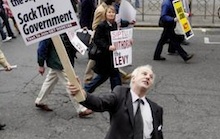
A new survey shows middle income families in the 26 Counties are struggling like never before with escalating unemployment coupled with serious mortgage repayment difficulties.
Charities and debt advisors are concerned a series of interest hikes could force thousands of families into default.
One in 20 residential mortgages is now in arrears for more than 90 days, a 12pc increase on figures revealed at the end of March.
Separately, the largest increase in people signing on for dole benefits came from those in the professional sector.
Live Register figures continued their upward climb last month by a further 30,198, reaching 455,000 unemployed. And the increase in the numbers signing on in the last six months has been in the professional category, up by 26.8pc, with a 14.6pc jump for the clerical and secretarial category and 11.9pc for workers in sales.
Middle-income families are continuing to slash payments on what they consider to be non-essential payments.
The Health Insurance Authority revealed that 10,000 people, or 800 per week, gave up their private health insurance in the second quarter of this year.
And figures released by the Central Statistics Office outlined that retail sales dropped by 0.1pc by volume in the 12 months to July and 0.2pc from June.
This was the first year-on-year drop in sales on record since January.
Despite what Taoiseach Brian Cowen says, economists believe that the country has “hit a wall” in terms of economic recovery as people have less disposable income to spend, which has a wider knock-on effect.
But householders are being slapped with rising prices on essential utilities bills as the ESB confirmed electricity bills for households will rise by 4.9pc from October 1 as a result of the Public Service Obligation (PSO) Levy.
Housing charity Respond said tens of thousands were at risk of default after building societies and banks hiked rates up by as much as 0.6pc in the summer months.
“Homeowners in Ireland are particularly vulnerable because there is no limit on the number of interest rate increases lenders can impose,” said a representative.
Debt advisors Money Village said that they are receiving more calls from people who have had an “income shock”.
“If people have borrowed on two incomes initially, now they could be left with just one income,” said managing director, Eugene McDarby.
The agency said that often financial difficulties can give rise to ill health, depression and family problems, and this can exacerbate the difficulties as well as giving rise to wider societal costs.
The number of homes repossessed during the first six months of the year jumped to 387, and banks applied for 170 court actions against struggling homeowners, an increase of 5pc.
Independent mortgage and insurance brokers group, PIBA, said it was a very worrying for homeowners who found themselves in serious difficulty.
Rachel Doyle, PIBA director, said rules on how to deal with debt-hit homeowners should take into account the still rising jobless figures.
‘WORKFARE’
Meanwhile, many of those who have been made unemployed could also be forced to work in degrading jobs to receive their welfare benefits.
The Dublin government has recently announced it’s ‘Work for Dole’ scheme -- which they say will take up to 10,000 people off the Live Register and get them working in the community for 19 hours a week. The participants will receive 210 euro a week, the level of a typical welfare payment.
It was reported that ultimately up to 40,000 of the unemployed could be forced onto this scheme, with few details emerging of the type of work envisaged.
Sinn Fein has accused the government of forcing an educated workforce into emigration.
“In the coming weeks, thousands of students will be entering colleges and universities of this State to further their education, develop their skills and foster the knowledge that can lead Ireland out of economic stagnation.
“These institutions are incubating the Smart economy but this Government is failing to deliver on the conditions that will allow its realisation through the delivery of jobs,” said Sinn Fein Finance spokesperson Arthur Morgan.
“The ranks of the unemployed have swelled enormously, but this Government has done nothing. More young people than ever are graduating into an economy that does not have sufficient work for them, leaving them with little choice but to emigrate or to stagnate on welfare payments.
“The Fianna Fail Smart Economy is one where zombie banks are on a life-support of continuous taxpayer’s money, where developers are able to re-coup their losses from making reckless investments in construction, where corrupt banking executives are able to retire with a near [euro]30 million pension package, while at the same time young people are thrust into unemployment, where their skills are lost and where emigration is rampant.
“Not only do we need measures to tackle unemployment head on, as my party has put forward, but we need to realise a Smart Economy is one where Fianna Fail and their cohort of banker and developer friends are NOT at the helm.”
![[Irish Republican News]](https://republican-news.org/graphics/title_gifs/rn.gif)
![[Irish Republican News]](https://republican-news.org/graphics/title_gifs/harp.gif)

